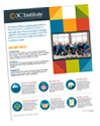Research & Technology Specialist
3C Institute is a Durham-based, double bottom line R&D company devoted to creating proven technologies that improve health and well-being on a global scale.
Do you enjoy working with technology?
Do you want to be part of a team that develops web-based interventions and tools for mental health and wellbeing?
If you answered yes, apply to become an integral part of our team as a Research & Technology Specialist. We are looking for an enthusiastic professional to support and assist on a variety of R&D projects.
Position Description
As a member of 3C’s research team, you would support the research aims of our product development efforts through usability, feasibility, iterative, and pilot testing using quantitative and qualitative methods. Researchers at 3C are also members of the broader development team of web-developers, artists, editors, subject matter experts, and programmers. You will support the development, testing, and application of 3C custom technology platforms. Researchers participate in the development and testing of new features for 3C technology platforms and applications. A technology background or coding expertise is not necessary. However, you must have a willingness to work extensively with technology.
Research responsibilities typically include: data management, data collection (in-person and web-based), measure and survey development, and working with clients to establish research needs
May also include: basic statistical analysis, summarization of research literature, IRB proposal development, participant recruitment and retention, and coordination of grant and contract submissions.
Technology responsibilities include: using 3C’s proprietary software to build surveys, reports, dashboards, and e-learning courses; reviewing and testing technology applications for accuracy.
This is a full-time position. No contractors or third parties.
Qualifications
- Experience in the implementation of applied research projects in school and community service settings
- Experience using survey building platforms or applications
- Research experience, knowledge, and interest in behavioral and mental health interventions, social-emotional interventions, or implementation science
- Strong research experience and knowledge (i.e., previous work on multiple studies and/or 3 plus years of research experience)
- Interest in technology-based interventions (or a willingness to learn)
- Strong writing and interpersonal communication skills
- Basic statistical analysis skills
- Ability to establish and balance priorities
- Self-motivated, highly organized, detail-oriented; and collaborative
Employment Type: Full-time, hybrid employee, NO CONTRACTORS OR THIRD PARTIES
Degree Requirements: Bachelor’s or Master’s degree from an accredited college or university in psychology, education, social science or equivalent discipline
Salary & Benefits: Salary is based on education and experience level. Excellent benefits and a flexible work environment are also available including:
- Health, Dental, Vision – HSA or PPO option
- 401(k) with matching
- Employee Assistance Plan
- 3 weeks of vacation with immediate accrual, no waiting period
- Additional Sick time and Holidays
- Flexible hours and option for hybrid remote and in-person schedule
Application Information: In order to be considered for the position, candidates must submit a letter of interest, salary requirements, and resume to admin@3cisd.com.


